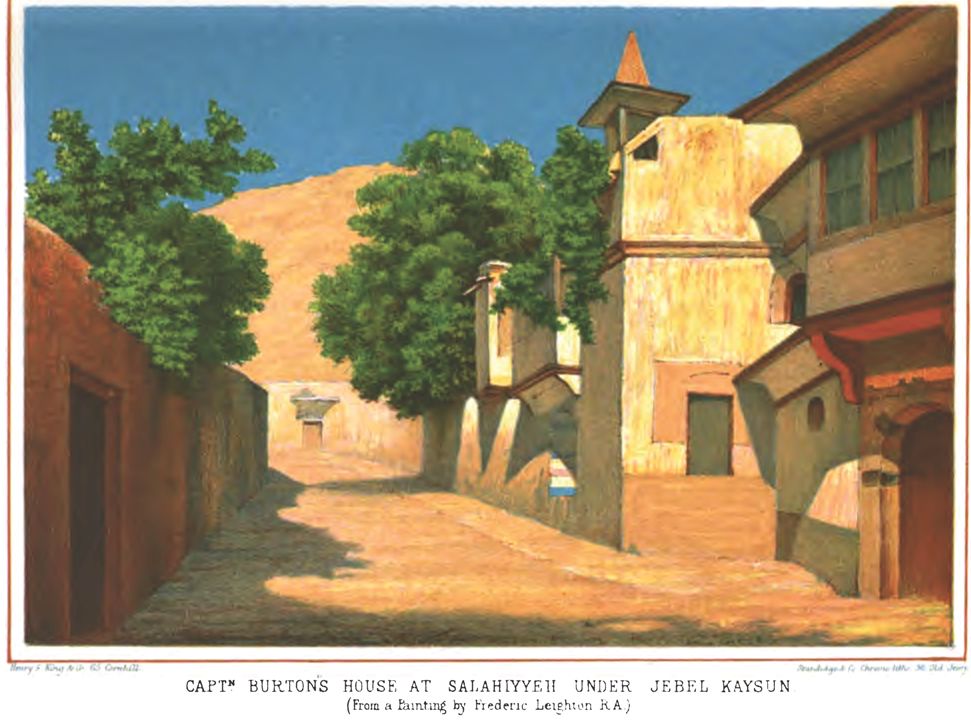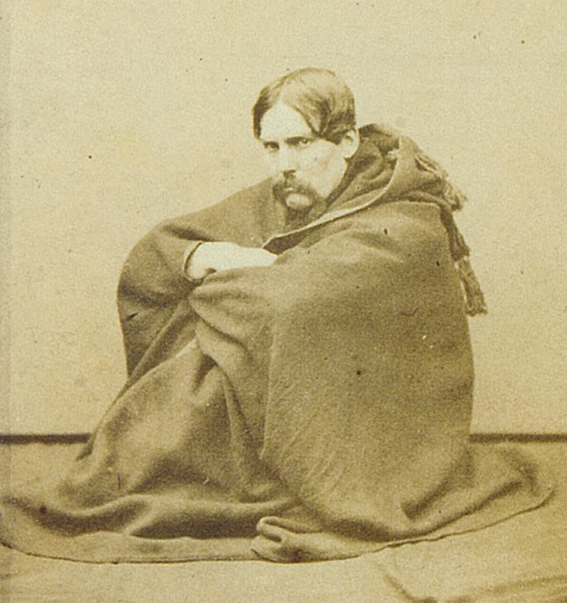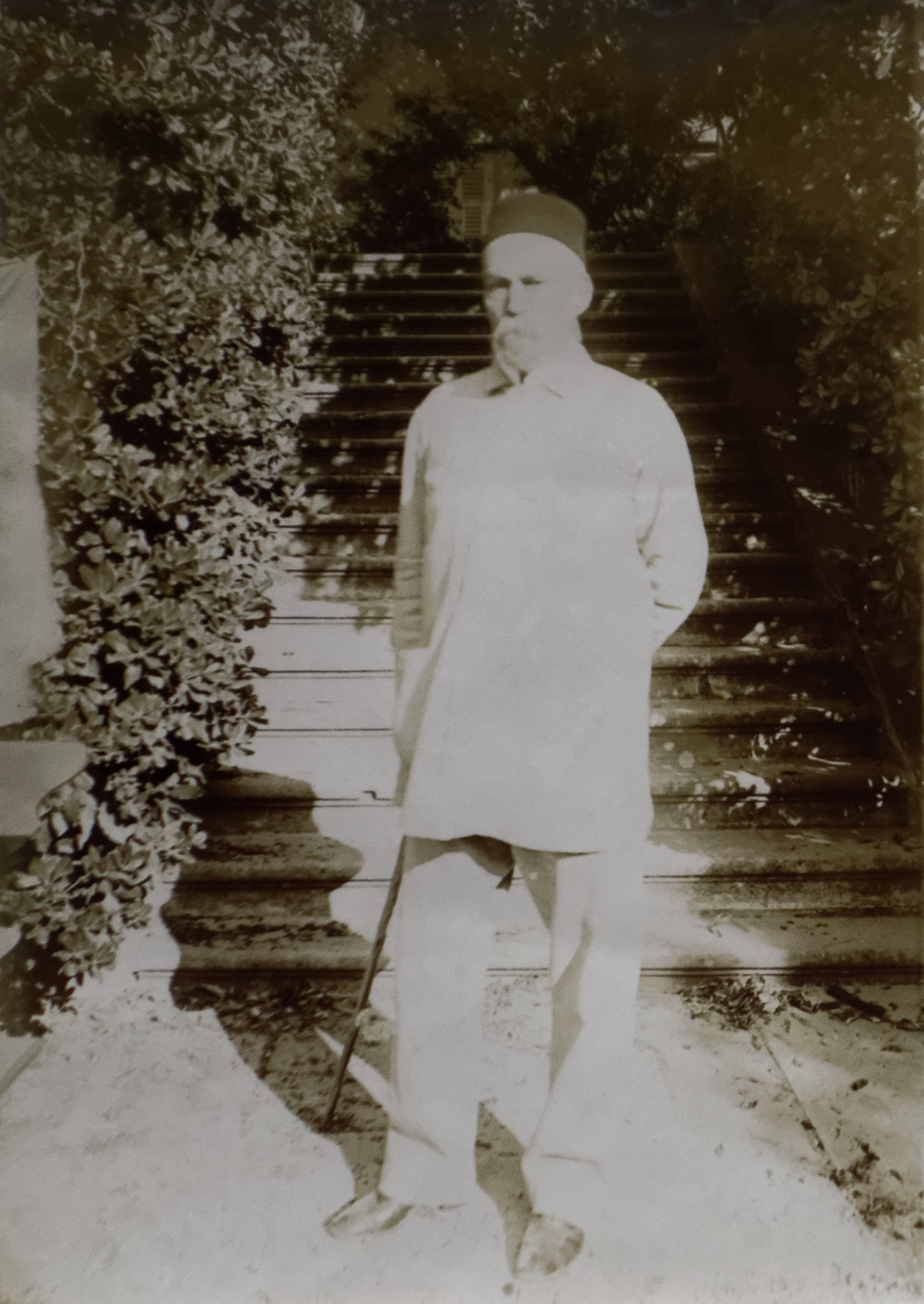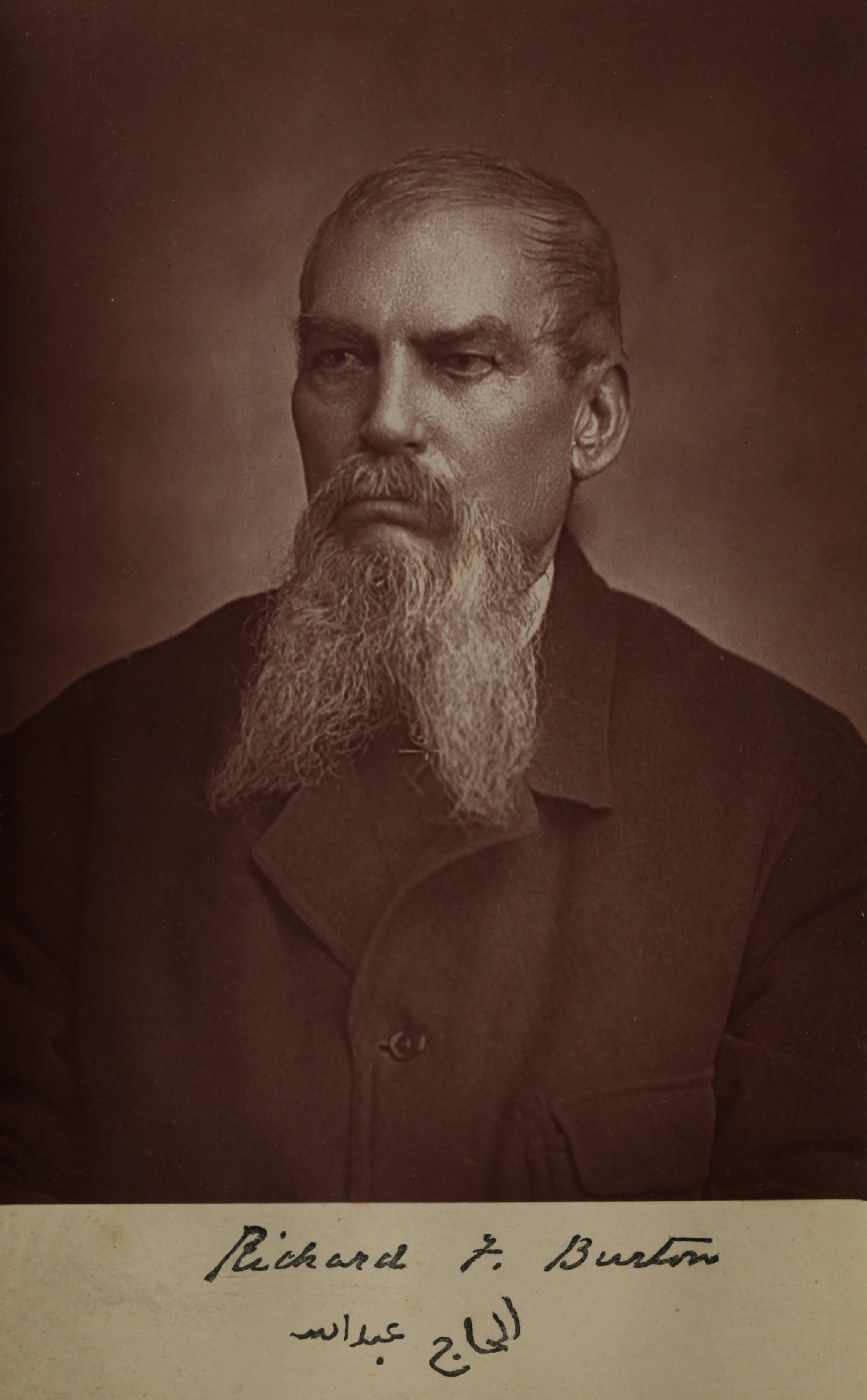Burton, Isabel.
1893. The Life of Sir Richard F. Burton. 2 vols.
London, Chapman and Hall.
A primary source for many of the Burton 'facts'.
Hitchman, Francis.
1887.
Richard F. Burton 2 vols. London.
The first life, written partly with Burton's own cooperation, which was
withdrawn after he became dissatisfied with the results. Much of volume 1
was simply reused by Isabel in her Life, e.g. the description of Burton's
Crimean campaign.
Wright, Thomas.
1906.
The Life of Richard Burton. 2 vols.
London, Everett.
Notorious for accusing Burton of plagiarizing Payne's edition of the Arabian
Nights.
Has many anecdotes collected from Burton's contemporaries not available
elsewhere.

Many thanks to Mick Walton for this superb Punch caricature. 'A bit ahead of us my boy'
say Baedeker and Murray's Guide.

"Our moonshee", from "Curry and Rice on Forty Plates"
by George Atkinson, 1859. An accidental resemblance to Burton?

Leighton's portrait of the Burton summer residence at Salahiyyeh outside
Damascus.

The Highly Civilized Man, taken by Claudet in London in 1861.
Life of Sir Richard Francis Burton
Soldier, explorer, linguist, ethnologist, and controversialist. Mostly self-educated, he mastered half a dozen Eastern languages after joining the Army of the East India Company in 1842, and produced ground-breaking ethnological studies of Sindh in the early 1850s. He then completed a famous pilgrimage to Mecca, in 1853, disguised as a Pathan; became the first European to visit the forbidden city of Harrar in 1855; served with Beatson's Horse in the Crimea in 1855; led the expedition to East Africa that in 1858 discovered Lake Tanganyika and, through his deputy John Hanning Speke, the headwaters of the Nile, Lake Victoria Nyanza. After ascending the Cameroons Mountains in 1862, he led a notable mission to the King of Dahomey in 1863; rafted down the Rio São Francisco in Brazil in 1867; collaborated in the publication of the Kama Sutra and Ananga Ranga; and in the 1880s translated the poetry of Camoens from Portuguese, and the first unexpurgated 1000 Nights and a Night from Arabic. He wrote over 80 books, from travel and exploration to anthropology, archaeology, ethnology, poetry and Eastern Literature.
The best way to understand Burton is to return to the primary sources, and read his own words from manuscript sources. See the second edition of The Book of Burtoniana, now available in three volumes on Amazon in print format, hardcover and softcover. This is a rich source of material on Burton, with a great many transcribed letters and other documents, enlivened by many rare illustrations. There is a Register with details on the bevy of connections and cronies who made up Burton's often murky world. It allows you to make your own mind up about many things, with evidence at hand.
There is a recent study by James Newman Paths Without Glory: Richard Francis Burton in Africa, was published in 2011 .Useful summaries of Burton's overall career are provided by his Dictionary of National Biography entry, and his entry in the famous 1911 edition of the Encyclopedia Britannica.
The primary source of information about Burton's early career is is his autobiographical fragment, first published as a postscript to Falconry in the Valley of the Indus (1852). This provides much of the mysterious air which surrounds his early career in the Army of the East India Company, since he intimates that he operated undercover, perhaps as a spy. No independent corroboration of these claims has ever surfaced, but they feature in most mentions of Burton. Also useful are first-hand reminiscences, many of which are listed below. See for example the first reminiscences by his niece Georgiana Stisted from Temple Bar July 1891.
Burton has been the subject of a dozen or more biographies, several of which are available here in full. Despite its many flaws, the foundation of these is his wife Isabel Burton's worshipful two volume Life, which contains one long and one short autobiographical fragment by Burton (repeating the Falconry fragment noted above), and is again the only source for many of the stories which surround Burton.
The most important archival biography is Mary Lovell's A Rage to Live (1996). Jon Godsall's important biography of Burton, The Tangled Web (2008). is a useful dose of skepticism. Byron Farwell's crisp Burton (1963) is the most balanced and critically detached. Fawn Brodie's The Devil Drives (1967) is still very readable. All biographies of Burton should be read skeptically as many of his biographers tend to accept the stories that surround his life uncritically.
Other Biographies
186xx. Anonymous, Biography of Captain Burton Taken from
'Photographic Portraits of Men of Eminence in Literature, Science
and Art, with Biographical Memoires by Ernest Edwards, B.A.;
from 'Extracts from the Press'; and 'The Anglo-Brazilian Times' of
October 1865.
Privately printed (no place or date). pp.8.
Richards, Alfred Bate.
1880.
A Sketch of the Career of Richard F. Burton.
Richards, Alfred Bate; Andrew Wilson and St. Clair Baddeley
1886.
A Sketch of the Career of Richard F. Burton (2nd edition).
London, Waterlow and sons.
The Bate Richards material is unchanged from the first edition of 1880.
Richards knew Burton at Oxford.
Stisted, Georgiana M.
1896. The True Life of Capt. Sir Richard F. Burton.
London, H.S. Nichols.
By Burton's niece, a rejoinder to Isabel Burton's Life. (The
Stisteds were convinced Protestants). Some original anecdotes not anywhere
else but otherwise deriviative.
Dodge, Walter Phelps
1907.
The Real Sir Richard Burton.
London, T. Fisher Unwin,.
Written as a defense of Burton, but introduces nothing new and makes several
minor errors of fact.
Not worth bothering with.
Downey, Fairfax
1931. Burton, Arabian Nights Adventurer. New York,
Scribner.
Derivative.
Schonfield, Hugh J.
1936. Richard Burton, Explorer. London, Herbert Joseph.
Dearden, Seton
1937. Burton of Arabia. New York, Robert M. McBride Co.
Derivative.
Bercovici, Alfred
1962. That Blackguard Burton! New York, Bobbs Merrill.
Written in historical novel form. Forgettable.
Farwell, Byron
1963. Burton: A Biography of Sir Richard Francis Burton . London,
Longmans.
(Second edition, 1988 with a new preface).
Very balanced, based mostly on the printed sources.
Edwardes, Allen
1963.
Death Rides a Camel. New York.
Derivative.
Brodie, Fawn
1967. The Devil Drives. New York, Norton.
Psychobiography, based on extensive research combined with speculation.
Very well written.
See important corrections in Lovell, 1998.
Hastings, Michael
1978. Sir Richard Burton: a Biography. London, Hodder & Stoughton.
Emulates Farwell in its critical distance from its subject. Has the least
tendentious treatment of the Nile controversy.
Rice, Edward.
1990. Captain Sir Richard Francis Burton: A Biography.
New York, Scribner.
Highly imaginative but dubious. Sold well, but seems to have used an
interpolation
technique to deduce 'facts'. See the
profile of Edward Rice at Columbia College Today (or
PDF). Rice died in 2001, at age 82, from
Parkinson's disease (obit).
McLynn, Frank
1990. Burton: Snow upon the Desert. London, John Murray.
McLynn, Frank
1992. From the Sierras to the Pampas: Richard Burton's Travels in the
America, 1860-69. London, Trafalgar Square.
Lovell, Mary
1998. A Rage to Live. a Biography of Richard and Isabel Burton
New York, Norton.
The best archival biography. Considerable fresh material. An attempt
to rehabilitate Isabel (this part fails to convince).
Cordiviola, Alfredo
2001. Richard Burton, a traveller in Brazil:
1865-1868. Edwin Mellen.
Universidade Federal de Pernambuco. Brazil.
Kennedy, Dane.
2005. The Highly Civilized Man: Richard Burton and the Victorian World.
Cambridge MA, Harvard University Press.
Godsall, Jon
2008. The Tangled Web
Leicester, Troubadour.
Isabel Burton
Wilkins, W. H.
1897.
The Romance of Isabel Lady Burton,
2 vols. New York, Dodd Mead.
Burton, Jean
1941. Sir Richard Burton's Wife. New York,
Alfred A. Knopf.
Reminiscences & Mentions:
Cameron, Vernon Lovett
1890.
"Burton As I Knew Him"
Fortnightly Review LIV, 878-84, December, 1890.
Stisted, Georgiana
1891.
"Reminiscences of Sir Richard Burton".
Temple Bar July 1891.
Linton, Eliza Lynn
1892.
"The Partisans of Wild Women".
Nineteenth Century March, 1892.
Swinburne, Algernon Charles
1892.
"Elegy".
Fortnightly Review
Vol. 58, 1-5, July 1, 1892.
Friswell, Laura Hain
1898. James Hain Friswell: a
Memoir. London, G. Redway.
McCarthy, Justin
1899. Reminiscences.
London, Harper & Bros.
McCarthy, Justin
1903. Portraits of the Sixties. London,
Harper & Bros.
Ouida
1906. "Richard Burton".
Fortnightly Review
Vol. 85, 1039-45, June 1906.
Friswell, Laura Hain
1906. In the Sixties and Seventies.
Boston, H. B. Turner & Co.
Stoker, Bram
1906. Personal Reminiscences of Henry Irving, 2 vols. London,
Heinemann.
Galton, Francis
1908. Memories of
My Life. London, Methuen.
Stanley, Sir Henry Morton
1909. Autobiography. Boston, Houghton Mifflin.
Chaille-Long, Charles, Bey
1912. My Life in Four Continents. London: Hutchinson & co.
Contains letters from Burton re gold prospecting in the Juba (ii: 414ff).
Harris, Frank
1920. Contemporary Portraits. New York, Brentano's.
Harris, Frank
1922. My Life and Loves. Paris, Privately Published.
Blunt, Wilfrid Scawen
1921. My Diaries Part Two [1900-1914]. New York,
Alfred A. Knopf.
Baker, F. Grenfell
1921.
"Sir Richard Burton as I Knew Him".
Cornhill Magazine, No. 304, October 1921, 411-23.
Dunraven, Earl of (Windham Thomas Wyndham-Quin)
1922. Past Times and Pastimes 2 vols. London, Hodder
and Stoughton.
Ionides, Luke
1924.
"Memories of Richard Burton".
Transatlantic Review March, 1924.
Nicolson, Harold
1930. Portrait of a Diplomatist. Boston, Houghton Mifflin.
Hale, Richard Walden
1930. Sir Richard Burton, a footnote in history. Boston, A. C.
Getchell.
Reminiscences from the Dana family, with whom Burton shared a coach on the route
to Salt Lake City.
Russell, Mrs. Charles E. B. (Lilian Rigby)
1935. General Rigby, Zanzibar and the Slave Trade. London, George
Allen & Unwin.
Written by Rigby's daughter this has many Speke/Rigby letters not published
anywhere else.
Bertrand Russell (ed.)
1937. Amberley Papers 2 vols. New York, Norton.
Swinburne, Algernon Charles
1959. The Swinburne Letters. ed. Cecil Lang, 6 vols. New
Haven, Yale
University Press.
Goncourt, Edmond et Jules de
1956. Journal: Mémoires de la vie littéraire
Vol 5., 1861-3. Paris, Fasquelle.
Didier, C.
1985. Sojourn with the Grand Sharif of Makkah [1854]. Cambridge,
Oleander Press.
Contains description of journey with Burton in 1854. pp. ix and 6ff.

